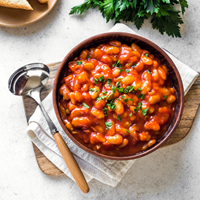July 1, 2024
Top 10 Weight Loss Tips: Your Guide to Losing Weight and Keeping it Off
When it comes to weight loss, each person has unique challenges and opportunities. Simple calorie restriction will typically cause short-term weight loss, but the key is to find a way to lose weight and keep it off for a lifetime. Here are my ten essential tips to guide your journey:
1. Increase Your Protein Intake
Protein is an important nutrient for weight loss since it helps build muscle, boosts metabolism, and keeps you feeling full longer. Try to eat protein first at meals, veggies second and starches last. Aim to include high-quality protein sources in each meal. Here are some examples:
- Lean meats: chicken breast, turkey, and lean cuts of beef
- Fish and seafood: salmon, tuna, and shrimp
- Plant-based options: beans, lentils, tofu, and tempeh
- Dairy products: Greek yogurt, cottage cheese, and low-fat milk
2. Eat More Plants
 Eating more plant-based foods can improve weight loss by providing fiber, vitamins, and minerals while being low in calories. Here’s how you can do it:
Eating more plant-based foods can improve weight loss by providing fiber, vitamins, and minerals while being low in calories. Here’s how you can do it:
-
Add vegetables to every meal: put spinach in your omelets, tomatoes in your sandwiches, or a side salad with dinner
-
Snack on fruits: apples, berries, and oranges make great portable snacks
-
Try meatless meals: veggie stir-fry, bean chili, or lentil soup
3. Get Quality Sleep
Getting enough quality sleep is important for weight management. Aim for 7-9 hours of sleep per night. Poor sleep can disrupt hormones that manage hunger and appetite, making it harder to stick to healthy eating habits.
4. Hydrate
Staying hydrated is important for overall health and will improve weight loss. Water helps regulate body temperature, keeps joints lubricated, and helps transport nutrients. Aim to drink at least 64 ounces of water a day. Sometimes, thirst is mistaken for hunger, leading to unnecessary snacking.
Learn more about Southern NH Weight Management
5. Eat (the Right) Carbs
Carbohydrates are not the enemy, but it's important to choose the right ones. Focus on complex carbs that provide long-lasting energy and are rich in fiber.
- Whole grains: brown rice, quinoa, whole wheat pasta, and oats
- Vegetables: sweet potatoes, carrots, and broccoli
- Legumes: chickpeas, black beans, and lentils
Avoid simple sugars and highly refined carbs like white bread, pastries, and sugary drinks.
6. Do It with a Partner or Friend 
Having a support system can make a huge difference in your weight loss journey. Partnering with a friend or joining a group can provide motivation, accountability, and encouragement. Whether it's a workout buddy or a healthy eating partner, having someone to share the journey with can increase your chances of success.
7. Avoid Processed Foods
Processed foods are often high in unhealthy fats, sugars, and sodium, which can slow your weight loss. Focus on whole, minimally processed foods. Cook at home as much as possible so you can control the ingredients and avoid the hidden calories found in many processed or restaurant foods.
8. Consider Professional Help
If you’re struggling with weight loss, consider seeking help from specialists. Southern NH Weight Management, for instance, offers comprehensive services including nutritionist consultations, medication management, and surgical options. Professional guidance can provide personalized strategies and support tailored to your specific needs.
9. Enjoy Exercise
It’s not a secret; regular physical activity is crucial for weight loss and overall health. Incorporate both cardio and strength training into your routine. Strength training helps build muscle, which increases your resting metabolic rate. Aim to do strength training twice a week. Mix it up with activities you enjoy keeping it fun and sustainable—whether it’s biking, hiking, walking your dog, taking a fitness class, yoga, swimming, or playing a sport.
10. Cut Back on Alcohol
Limiting alcohol consumption can help you lose weight for several reasons. First, alcoholic beverages are often high in calories without providing any nutrition. Secondly, alcohol can increase appetite and reduce inhibitions, leading to overeating or making poor dietary choices. Also, the body prioritizes metabolizing alcohol over other nutrients, which can slow down the metabolism of fats and carbohydrates. Finally, it can disrupt sleep patterns, lowering metabolism and energy levels.
Final Thoughts
Weight loss is an individual journey that involves making life-long lifestyle changes. By incorporating these tips, you can improve your health and achieve your weight loss goals. Remember, it’s not about perfection but progress. Celebrate your small victories along the way and stay committed to your long-term health.
Tricia Keville, MSN, APRN practices at Southern NH Weight Management in Nashua, New Hampshire.

